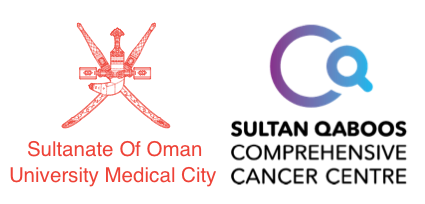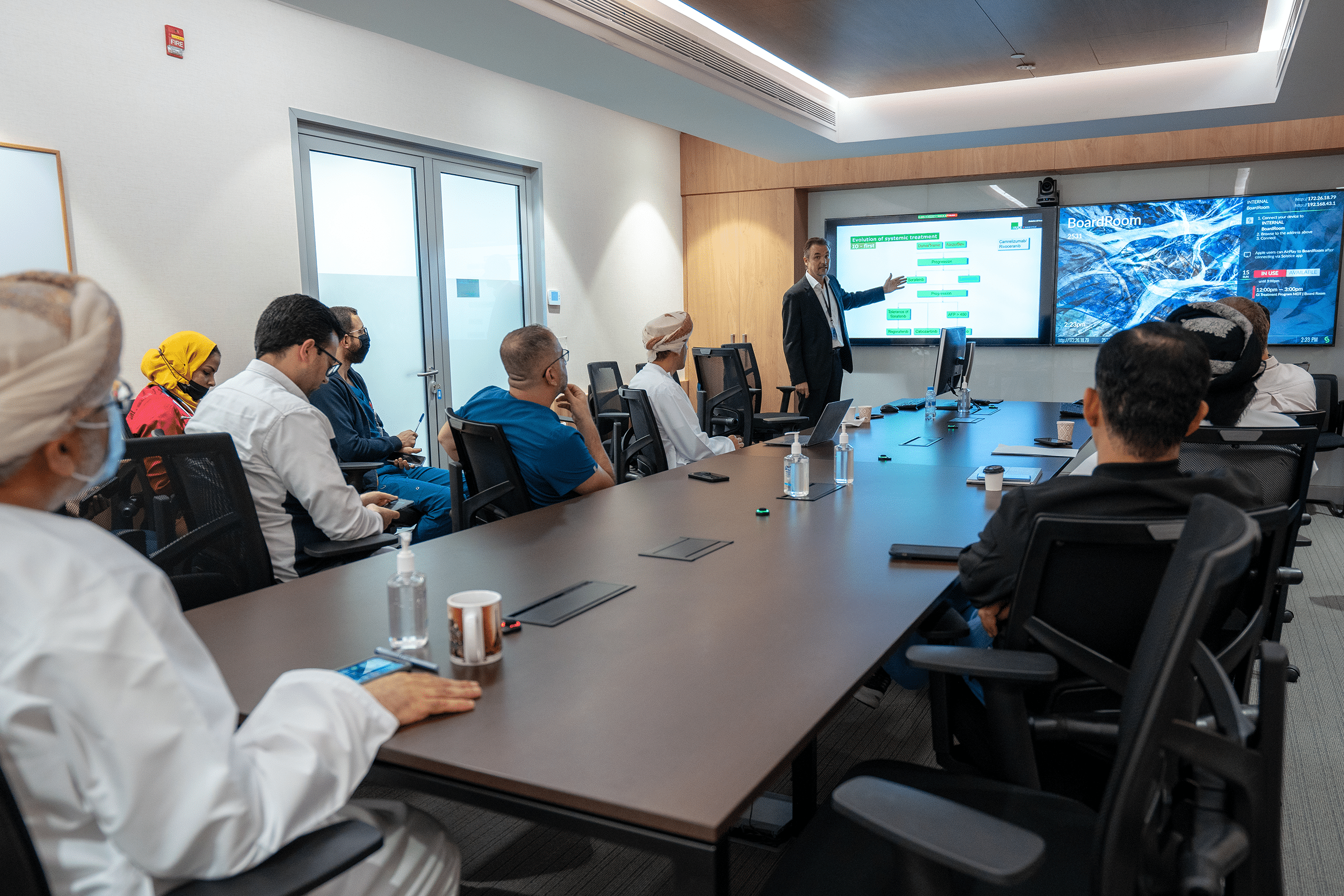HBP café (a scientific dialogue session discusses the latest developments in GI malignancies management)
Gastrointestinal Cancers Program organized several scientific dialogue sessions under the name of (HBP café), which comes within the framework of exchanging medical knowledge and experiences in gastrointestinal cancers field, as the program hosts international experts from various health institutions and universities. The (HBP café) program began in 2022 and addressed rich and latest topics aiming to enhance the scientific competency of healthcare personals within Sultan Qaboos Comprehensive Cancer Care and Research Centre and beyond.
Dr. Memeo started the session (Liver precancerous lesions: From multidisciplinary management to robotic surgical treatment) with the discussion of the different types of precancerous liver lesions and their follow-up and management plan. This was followed by discussing the pathophysiology of degeneration and transformation to malignant lesions. The talk ended by presenting some examples and videos of robotic surgical resection of such lesions.
The virtual meeting of (Liver transplantation for nonresectable colorectal liver metastasis. Where are we?) started with the presentation of some statistics concerning colorectal liver metastasis. Professor Nadalin presented then the treatment options for nonresectable colorectal liver metastasis. This was followed by a detailed talk about the evidence and advantage of liver transplantation in case of nonresectable colorectal liver metastasis.
Professor Guiu started his talk about (Liver venous deprivation and radioembolization for hepatocellular carcinoma. Where are we?) with an introduction about portal vein embolization, liver venous deprivation techniques used for future liver remnant volume and function enhancement as well as a talk about radioembolization for hepatocellular carcinoma. This was followed by presenting the techniques and the pathophysiology behind such procedures. He ended his presentation with the current evidence of such techniques efficiency.
The virtual meeting of (Perihilar cholangiocarcinoma, how to deal with it today?) began with the definition and epidemiology concerning perihilar cholangiocarcinoma. As a second point, professor Donadon talked about the diagnostic work-up needed and the indications of resection of perihilar cholangiocarcinoma. The outcomes of the surgical resection were then discussed resection were then discussed.
Professor Troisi discussed in his presentation about (Advanced laparoscopic and robotic HPB surgery: Oncological results), the evolution of robotic and laparoscopic HPB surgery. He presented as well the learning curves needed for both techniques. In the second part, he presented the use of green indocyanine as an adjunct during minimally invasive HPB surgery. He ended his presentation with the current evidence of minimally invasive HPB surgery with its oncological results.
(Interventional endoscopy in GI cases) virtual meeting was meant to discuss the application of interventional endoscopy in gastrointestinal cases. The talk started with an article presentation about the endoscopic ultrasound guided radiofrequency ablation of pancreatic lesions. In the second part, Dr Valats presented a real case scenario of an endoscopic intervention for an esophageal lesion
The virtual meeting of (Which robotic platform to choose? How to establish robotic surgery service?) was meant to discuss the robotic surgery. Dr. Bianco presented at the beginning the evolution of robotic surgery. This was followed by a comparison between the laparoscopic and robotic surgical access and techniques and then a comparison between the different robotic platforms. He talked subsequently about the future of minimally invasive surgery. At the end, he talked about the manner of establishing a new robotic surgery service.
During his presentation of (Emerging Novel strategies for early and Intermediate stages.), Professor Enrico in De Toni (Professor of Internal Medicine and Head of the Gastrointestinal Oncology Unit – Department of Medicine – University of Munich) talked about the development of different types of treatments used to treat hepatocellular carcinoma with their effect in overall survival. In the second part of his talk, he detailed some of the targeted therapies used currently including the immunotherapy as a first-line of treatment for the cases requiring systemic treatment. He pointed as well the importance of the researches and the clinical trials in evaluating new treatment modalities. At the end, there was discussion of some tricky clinical scenarios where the management plan is variable due to the unusual presentation.
The last hosting of the Gastrointestinal Cancers Program for 2023 was hosting Professor Fabrizio Panaro from Montpellier university in France for one week. During his visit, he participated in multiple activities targeting physicians and nurses. In an interactive session with the nurses, he discussed the nursing roles in the perioperative management of HPB surgical patients including ERAS protocol.
He participated as well in the multidisciplinary team discussion of GI cancer cases. There was as well a dedicated day for residents and trainees where a hands-on session was done focusing on laparoscopic surgery tips followed by a journal club discussing the future liver remnant evaluation and optimization and including two resident articles presentations.
It is noteworthy that (HBP café) sessions are still ongoing, and the center announces them through its official accounts on social media, and it is also possible to view the recordings of the previous sessions through the center’s official website cccrc.gov.om.





